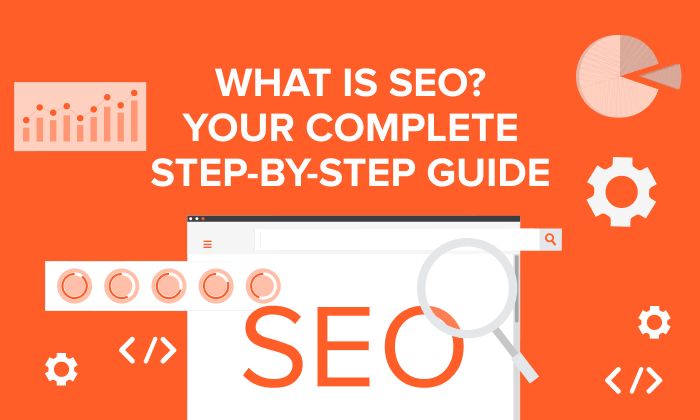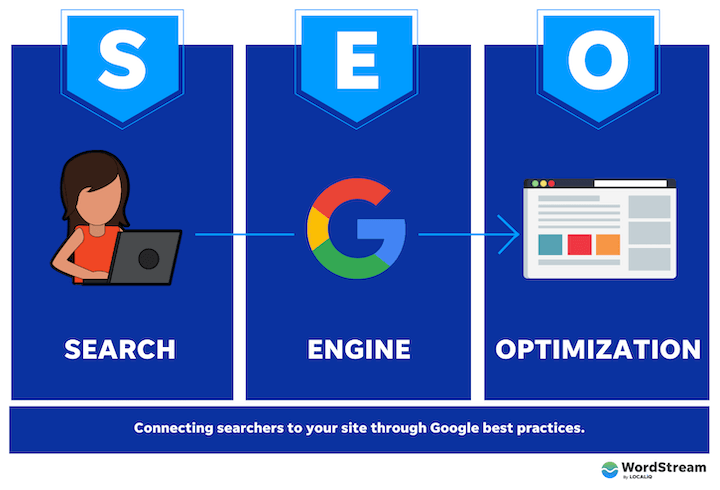![]()
Thank you for reading this post, don't forget to subscribe!
Unlock the secrets to boosting your website’s visibility and ranking with simple SEO strategies that drive traffic and conversions.

Image courtesy of via DALL-E 3
Table of Contents
- Introduction: What is SEO?
- Getting Started with SEO
- Keywords: The Building Blocks of SEO
- On-Page Optimization Techniques
- The Role of Content in SEO
- Making Friends with Google
- Off-Page SEO: The World Beyond Your Site
- Don’t Forget About Technical SEO
- Track Your Progress with Analytics
- Learning from the Pros: SEO Strategists
- Putting It All Together: Your SEO Checklist
- Conclusion: SEO is a Journey
Introduction: What is SEO?
Let me introduce you to the world of SEO. SEO stands for search engine optimization. It may sound like a big and complicated phrase, but it’s actually quite simple. SEO is all about making your website visible and easy to find on search engines like Google.
Imagine you have a favorite book in a huge library, but nobody knows where to find it because it’s hidden among thousands of other books. SEO is like putting a spotlight on your book so that everyone can see it right away.
When you search for something on Google, like your favorite video game or a recipe for cookies, the websites that show up at the top of the page have good SEO. They have used specific strategies to make sure Google knows their website exists and that it matches what people are searching for.
Getting Started with SEO
When diving into the world of SEO, the first step is understanding what it is all about and how it can benefit your website. SEO, short for Search Engine Optimization, is the process of optimizing your site to rank higher in search engine results pages. This means more visibility for your website, potentially leading to more visitors and customers.
Understanding Your Site’s Purpose
Before delving into the nitty-gritty of SEO, it’s crucial to have a clear understanding of your site’s purpose. What are your goals for the website? Who is your target audience? By defining these aspects, you can align your SEO efforts to ensure that your site is optimized to attract the right visitors who are interested in what you have to offer.
Keywords: The Building Blocks of SEO
Keywords are like magic words that help people find what they’re looking for on the internet. In the world of SEO, or search engine optimization, keywords play a crucial role in making sure websites show up on search results. So, let’s dive into the fascinating world of keywords and discover why they are the building blocks of SEO.

Image courtesy of via Google Images
Finding the Right Keywords
Choosing the right keywords for a website is like picking the perfect secret code that unlocks the door to your site. Imagine you have a website all about delicious cupcakes. If someone types “yummy cupcakes” into a search engine like Google, you want your site to pop up on the first page so they can marvel at your mouth-watering treats!
To find the best keywords, think about what words or phrases people would type into a search engine to find your website. Put yourself in their shoes. What would you type if you were looking for your site? Brainstorm and make a list of these keywords to sprinkle them throughout your website. This way, when someone searches for those words, your site has a better chance of showing up.
On-Page Optimization Techniques
When it comes to making your website stand out on search engines like Google, on-page optimization techniques play a crucial role. Let’s dive into some strategies that can help boost your site’s visibility by effectively using SEO keywords.
Title Tags and Meta Descriptions
Title tags and meta descriptions are like the cover of a book – they give a sneak peek of what your page is about. It’s important to include relevant keywords in these tags to help search engines understand the content of your page. Crafting compelling and informative titles and meta descriptions can also entice users to click on your link in search results.
Headers and Sub-Headers
Headers are like chapter titles in a book – they break down the content into digestible sections for both readers and search engines. By using headers and sub-headers with keywords strategically placed, you can make it easier for search engines to crawl and understand your content, ultimately improving your SEO.
Optimizing Images
Images are not just there to make your website visually appealing; they can also be optimized for search engines. Adding descriptive alt text and using relevant keywords in image file names can help your images show up in image searches and contribute to your overall SEO efforts.
The Role of Content in SEO
In the world of SEO, creating high-quality content is like planting seeds for your website to grow and flourish. Let’s dive into how content plays a crucial role in boosting your site’s visibility on search engines.

Image courtesy of via Google Images
Quality Over Quantity
When it comes to content, remember that it’s not about churning out a ton of articles or blog posts just to have something on your site. Quality is key. Make sure your content is well-written, engaging, and provides valuable information to your visitors. Search engines like Google value websites that offer insightful content that meets the needs of users.
Using Keywords in Your Content
Keywords are like magic words that help search engines understand what your content is about. It’s important to sprinkle relevant keywords naturally throughout your content to signal to search engines what topics you’re covering. However, be careful not to overdo it with keywords, as this can actually hurt your SEO efforts. Focus on incorporating keywords in a way that flows naturally within your writing.
Making Friends with Google
Google is like the wise owl of the internet. It knows everything and helps us find what we’re looking for. But how does Google decide which websites to show when we search for something? That’s where Google SEO optimization comes in.
Understanding Google’s Algorithm
Google uses a special formula called an algorithm to determine the order of websites in search results. It looks at things like keywords, website quality, and relevance to decide where a site should rank. The goal is to provide the best and most useful results to users.
Mobile-Friendly is a Must
Have you ever tried to visit a website on your phone and it looked all weird and squished? That’s because the site isn’t mobile-friendly. Google wants to make sure websites are easy to use on phones and tablets, so having a mobile-friendly site is crucial for good SEO.
By understanding how Google works and making your site mobile-friendly, you can start building a good relationship with Google and improve your chances of showing up in search results. Remember, Google wants to help people find what they’re looking for, so if your website is helpful and easy to use, Google will be more likely to recommend it to others.
Off-Page SEO: The World Beyond Your Site
Now that you have optimized your website with keywords, quality content, and on-page techniques, it’s time to explore the world beyond your site – the world of off-page SEO. Off-page SEO refers to external factors that can impact your site’s search engine rankings, one of the most important being backlinks.

Image courtesy of via Google Images
Backlinks are links from other websites that direct users to your site. Think of them as upvotes from other sites, telling search engines that your website is valuable and reputable. The more high-quality backlinks you have, the better your site will rank in search results.
When other websites link back to your site, they are essentially vouching for your content. This can help increase your site’s authority and credibility in the eyes of search engines like Google. However, not all backlinks are created equal. It’s important to focus on building backlinks from reputable sites that are relevant to your industry or niche.
Don’t Forget About Technical SEO
When it comes to optimizing your website for search engines, there’s more to it than just choosing the right keywords and creating quality content. Technical SEO plays a crucial role in determining how well your site ranks in search results. Let’s delve into some often overlooked aspects of technical SEO that can make a big difference.
Improving Site Speed
One important factor in technical SEO is the speed at which your website loads. Nobody likes waiting around for a slow website to load, and search engines like Google take site speed into account when ranking pages. By optimizing your site’s speed, you can keep visitors happy and improve your SEO at the same time.
Secure Your Site with HTTPS
Another technical aspect to consider is the security of your website. Google gives preference to websites that have implemented HTTPS, as it ensures a secure connection between the user and the site. This added layer of security not only protects your visitors’ data but also sends a positive signal to search engines about the trustworthiness of your site, potentially boosting your SEO efforts.
Track Your Progress with Analytics
When you’re working hard to improve your website’s SEO, it’s essential to track your progress to see what’s working and what may need adjustments. This is where analytics come into play. Analytics are tools that help you analyze and understand your website’s performance.
Image courtesy of via Google Images
Setting Up Google Analytics
Google Analytics is a powerful tool that allows you to track various metrics related to your website’s traffic and performance. To set up Google Analytics, you’ll need to create an account and add a tracking code to your website. This tracking code will collect data on how visitors interact with your site.
Once Google Analytics is set up, you can access a wealth of information, including the number of visitors to your site, where they are coming from, which pages they visit the most, and how long they stay on each page. This data can help you identify trends, understand user behavior, and make informed decisions to improve your site’s SEO.
By regularly monitoring your website’s analytics, you can track the impact of your SEO efforts over time. If you notice a particular page is not performing well, you can delve deeper into why that might be and make changes accordingly. On the flip side, if you see a page getting a lot of traffic, you can investigate what’s working well and apply those strategies to other parts of your site.
Remember, SEO is not a one-time task but an ongoing process. By utilizing analytics tools like Google Analytics, you can continuously measure your site’s performance, tweak your strategy as needed, and ultimately drive more traffic to your website.
Learning from the Pros: SEO Strategists
SEO can seem overwhelming at first, but don’t worry, you’re not alone in this journey. There are professionals out there who specialize in helping websites like yours climb the search rankings. Let’s talk about how SEO strategists can offer valuable insights and guidance to optimize your site.
When to Hire an SEO Strategist
While you can certainly learn a lot about SEO on your own, there may come a time when bringing in an expert is the best decision for your website. Here are a few scenarios where hiring an SEO strategist might be a good idea:
If you’re launching a new site and want to start off on the right foot, an SEO strategist can help you set a solid foundation with the right keywords, content structure, and optimization techniques.
For established websites that are struggling to rank well on search engines, an SEO strategist can conduct a thorough audit to identify areas for improvement and implement strategies to boost visibility.
If you’re unsure about the latest SEO trends, algorithms, or best practices, an SEO strategist can keep you informed and ensure your site stays ahead of the curve.
Remember, hiring an SEO expert doesn’t mean giving up control of your website—it means partnering with someone who has the knowledge and experience to help you reach your SEO goals more effectively.
Putting It All Together: Your SEO Checklist
In the world of websites, SEO is like a secret code that helps your site be seen by more people. To make sure your website is the best it can be, let’s go over a simple checklist that covers all the important stuff we’ve talked about.

Image courtesy of via Google Images
Understanding Your Site’s Purpose
First things first, think about what your website is all about. Knowing your site’s purpose will help you choose the right keywords and create content that matches what you want to share with the world.
Finding the Right Keywords
Keywords are like magic words that help people find your website. Think about what words or phrases your audience might type into a search engine, and use those keywords in your content.
Title Tags and Meta Descriptions
Make sure each page on your website has a unique title tag and meta description. These little snippets tell search engines and users what your page is about, so make them catchy and informative.
Headers and Sub-Headers
Organize your content using headers and sub-headers so both people and search engines can easily understand your information. It’s like making a table of contents for your website!
Optimizing Images
Don’t forget about your images! Give them descriptive file names and alt text to help search engines know what the images are about. It’s like giving your pictures a voice.
Quality Over Quantity
When creating content, focus on quality over quantity. Write well and provide valuable information that your audience will find helpful. Good content is like a magnet for visitors.
Using Keywords in Your Content
Sprinkle keywords naturally throughout your content. Don’t force them in, but let them flow smoothly within your writing. Keywords should blend in like they belong there.
Understanding Google’s Algorithm
Google is like a big library with lots of rules to decide which books (websites) show up first when you search. Try to understand Google’s rules so your site can play by them.
Mobile-Friendly is a Must
Make sure your website looks good and works well on phones and tablets. Google loves mobile-friendly sites, and so do your visitors!
The Power of Backlinks
Get other websites to link to yours. Backlinks are like referrals that show Google your site is popular and trustworthy. They can help boost your SEO.
Improving Site Speed
Keep your website speedy so visitors don’t get frustrated waiting for pages to load. A fast site not only makes users happy but also helps with SEO.
Secure Your Site with HTTPS
Make sure your site is secure with HTTPS. Security is important for both your visitors and search engines, so don’t forget to get that green padlock!
Setting Up Google Analytics
Use Google Analytics to track how your website is doing. This tool can show you what’s working and what’s not, helping you make smart decisions to improve your site.
When to Hire an SEO Strategist
If you feel stuck or overwhelmed with SEO, consider hiring an expert to help you out. SEO strategists can provide guidance and support to take your website to the next level.
Final Words: Staying Up to Date
Remember, SEO is always changing. Keep learning and adapting to new practices as they evolve. Stay curious and never stop exploring the world of SEO!
Conclusion: SEO is a Journey
As we reach the end of our discussion on SEO, it’s essential to remember one crucial point: SEO is a journey, not a destination. It’s not a one-time task that you can check off your list and forget about. Instead, it’s an ongoing process that requires dedication and effort to see results.
Just like a journey, SEO has its ups and downs. Sometimes you may see immediate improvements in your site’s ranking, while other times progress may be slower. But the key is to stay consistent and patient, as the results will eventually come.
Google SEO optimization is constantly evolving, with the search engine regularly updating its algorithms to provide the best user experience. This means that what works today may not work tomorrow, so staying informed and adapting to these changes is crucial for success.
Remember, SEO is not just about optimizing for search engines; it’s also about creating a positive user experience for your visitors. By following best practices and providing valuable content, you can attract more traffic to your site and ultimately achieve your goals.
So, as you continue on your SEO journey, keep learning, experimenting, and refining your strategies. With time and dedication, you’ll see your site climb the search rankings and reach more people than ever before. SEO may be a challenging road, but the rewards are well worth the effort.
Get Your Free SEO Report Now.
Brought to you by StoreAndHost GET YOUR SEO-REPORT
About us and this blog
We are a digital marketing company with a focus on helping our customers achieve great results across several key areas.
Request a free quote
We offer professional SEO services that help websites increase their organic search score drastically in order to compete for the highest rankings even when it comes to highly competitive keywords.
Subscribe to our newsletter!
More from our blog
See all postsRecent Posts
- Boost Your Pagerank with Proven SEO Tips April 2, 2024
- SEO Cheat Sheet: Top Google Tips April 2, 2024
- Boost Sales with Google SEO Optimization April 2, 2024










